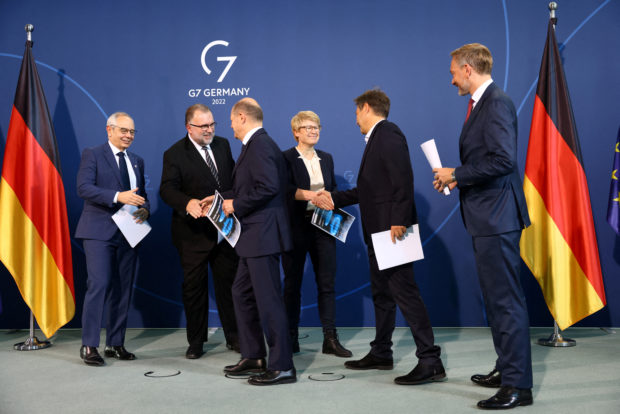
Michael Zissis Vassiliadis, Siegfried Russwurm, Veronika Grimm, German Chancellor Olaf Scholz, Economy Minister Robert Habeck and Finance Minister Christian Lindner shake hands as they hold the Independent Commission For Natural Gas and Heat proposal report at the Chancellery in Berlin, Germany October 10, 2022. REUTERS/Christian Mang
BERLIN – Germany said on Monday it aimed to urgently implement a 96-billion euro ($93 billion) plan to ease pressure on consumers from surging gas prices as it was warned the supply situation heading into winter remained tense even with full reserves.
Berlin said it supported the commission’s proposals to give households and small and medium-sized businesses a one-off payment worth one month’s gas bill this year and a mechanism to limit prices from March, and it was working to implement them.
“The supply situation remains tense despite the filled storage facilities,” Michael Vassiliadis, head of trade union IG BCE and one of the commission experts, told a news briefing, adding that the panel hoped their plan would curb inflation.
If adopted, the scheme would be paid for by a 200 billion euro relief package Chancellor Olaf Scholz’s government announced last month to reduce the impact of energy prices on Europe’s largest economy, which experts have estimated needs to cut consumption by a fifth to get through winter and beyond without rationing.
German inflation hit its highest in more than a quarter of a century in September at 10.9 percent, driven up by higher energy costs that have piled pressure on Scholz to address a cost of living crunch exacerbated by Russia’s invasion of Ukraine.
Shares in Germany’s energy-intense companies soared on the prospect of financial help, with Covestro, BASF, Heidelberg Materials, Lanxess and Thyssenkrupp all up 4-7 percent.
European Union members have been drawing up a range of initiatives to cope with plummeting supplies from Russia, which once supplied 40 percent of Europe’s needs, and rocketing gas prices, although Germany has faced some criticism for pressing ahead with plans that poorer EU members cannot match.
Under a second stage of Germany’s plan, the brake would cut the gas price to 12 cents from March through to the end of April 2024 on 80 percent of usage. For large industrial customers, a price brake of seven cents is to apply to the procurement price from January 2023.
Experts say the advantage of a one-off payment is that it provides immediate relief. The disadvantage is that it does not encourage reduced energy use.
Comparison portal Verivox said its calculations showed the brake proposal would reduce household gas costs by around 41 percent.
“Nevertheless, households are facing a very expensive winter because most of the relief will not take effect until next March,” said Thorsten Storck, energy expert at Verivox.
The VCI Chemical Industry Association welcomed the plan.
“The gas price brake is a very important first step that gives many companies back some confidence that they can overcome the crisis,” VCI Managing Director Wolfgang Grosse Entrup said in a statement, calling for an electricity price brake as well.
($1 = 1.0308 euros)

